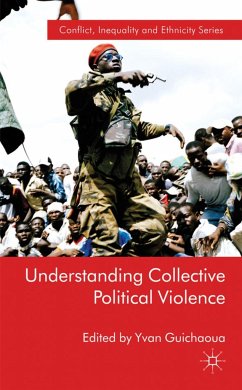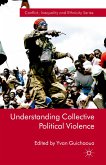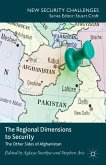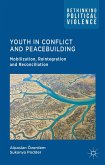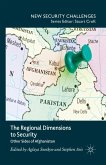Understanding Collective Political Violence
Herausgegeben:Guichaoua, Y.
Understanding Collective Political Violence
Herausgegeben:Guichaoua, Y.
- Gebundenes Buch
- Merkliste
- Auf die Merkliste
- Bewerten Bewerten
- Teilen
- Produkt teilen
- Produkterinnerung
- Produkterinnerung
Understanding Collective Political Violence offers a unique view on contemporary processes of violent political mobilization across continents: Africa, Latin America, South East Asia and the Middle East. It pays particular attention to unconventional combatants such as women or children and details the drivers of their violent engagement.
Andere Kunden interessierten sich auch für
![Understanding Collective Political Violence Understanding Collective Political Violence]() Understanding Collective Political Violence75,99 €
Understanding Collective Political Violence75,99 €![War Veterans in Postwar Situations War Veterans in Postwar Situations]() War Veterans in Postwar Situations38,99 €
War Veterans in Postwar Situations38,99 €![The Regional Dimensions to Security The Regional Dimensions to Security]() Aglaya SnetkovThe Regional Dimensions to Security38,99 €
Aglaya SnetkovThe Regional Dimensions to Security38,99 €![Rethinking Peacekeeping, Gender Equality and Collective Security Rethinking Peacekeeping, Gender Equality and Collective Security]() Rethinking Peacekeeping, Gender Equality and Collective Security75,99 €
Rethinking Peacekeeping, Gender Equality and Collective Security75,99 €![Youth in Conflict and Peacebuilding Youth in Conflict and Peacebuilding]() A. ÖzerdemYouth in Conflict and Peacebuilding75,99 €
A. ÖzerdemYouth in Conflict and Peacebuilding75,99 €![The Regional Dimensions to Security The Regional Dimensions to Security]() Aglaya SnetkovThe Regional Dimensions to Security38,99 €
Aglaya SnetkovThe Regional Dimensions to Security38,99 €![The East Asian Peace The East Asian Peace]() M. WeissmannThe East Asian Peace38,99 €
M. WeissmannThe East Asian Peace38,99 €-
-
-
Understanding Collective Political Violence offers a unique view on contemporary processes of violent political mobilization across continents: Africa, Latin America, South East Asia and the Middle East. It pays particular attention to unconventional combatants such as women or children and details the drivers of their violent engagement.
Produktdetails
- Produktdetails
- Conflict, Inequality and Ethnicity
- Verlag: Palgrave Macmillan / Palgrave Macmillan UK / Springer Palgrave Macmillan
- Artikelnr. des Verlages: 978-0-230-28546-0
- 2010
- Seitenzahl: 291
- Erscheinungstermin: 8. November 2011
- Englisch
- Abmessung: 218mm x 140mm x 23mm
- Gewicht: 465g
- ISBN-13: 9780230285460
- ISBN-10: 0230285465
- Artikelnr.: 33610753
- Herstellerkennzeichnung
- Libri GmbH
- Europaallee 1
- 36244 Bad Hersfeld
- gpsr@libri.de
- Conflict, Inequality and Ethnicity
- Verlag: Palgrave Macmillan / Palgrave Macmillan UK / Springer Palgrave Macmillan
- Artikelnr. des Verlages: 978-0-230-28546-0
- 2010
- Seitenzahl: 291
- Erscheinungstermin: 8. November 2011
- Englisch
- Abmessung: 218mm x 140mm x 23mm
- Gewicht: 465g
- ISBN-13: 9780230285460
- ISBN-10: 0230285465
- Artikelnr.: 33610753
- Herstellerkennzeichnung
- Libri GmbH
- Europaallee 1
- 36244 Bad Hersfeld
- gpsr@libri.de
ANA M. ARJONA Postdoctoral Researcher at Columbia University, USA MAGALI CHELPI-DEN HAMER Research Fellow at the Amsterdam Institute for Social Science Research (AISSR), University of Amsterdam, the Netherlands FRÉDÉRIC DEYCARD Completed his Ph.D. in Political Science at the Centre of Africa Studies, University of Bordeaux, France LUISA MARIA DIETRICH ORTEGA Doctorate Candidate in Political Science at the University of Vienna, Austria LAURENT GAYER Research Fellow at the French National Centre of Academic Research (CNRS), currently posted at the Centre of Humanities (CSH), Delhi, India KONE GNANGADJOMON Doctoral Student in Sociology at the University of Bouaké, Côte d'Ivoire, and Research Associate at the Swiss Centre of Academic Research in Côte d'Ivoire (CSRS-CI) FRANCISCO GUTIERREZ SANIN Researcher at the Institute of Political Science and International Relations of the National University of Colombia, USA JASON HART Lecturer in International Development at the University of Bath and Research Associate at the Refugee Studies Centre, University of Oxford, UK STATHIS KALYVAS Arnold Wofers Professor of Political Science at Yale University, USA SEEMA SHEKHAWAT Post-Doctoral Fellow at the University of Mumbai, India FRANCES STEWART Emeritus Professor of Development Economics and Director of the Centre for Research on Inequality, Human Security and Ethnicity (CRISE) at the University of Oxford, UK.
Introduction: Individual Drivers of Collective Violence and the Dynamics of Armed Groups; Y.Guichaoua PART I: JOINING INSURGENCIES: CONTEXTS, BELIEFS AND AGENCY Militarized Youth in Western Côte d'Ivoire: Who are They? Why did They Fight?; M.C.den Hamer Political Cultures and Tuareg Mobilizations: Rebels of Niger, from Kaocen to the Mouvement des Nigériens Pour la Justice; F.Deycard The Mobilization of Children: What's the Difference?; J.Hart Gendered Patterns of Mobilisation and Recruitment for Political Violence, Experiences from Three Latin American Countries; L.M.D.Ortega Have Gun, Will Travel: Interpreting the Trajectories of Female Irregular Combatants; L.Gayer Engendering Armed Militancy in Kashmir: Women as Perpetrators of Violence; S.Shekhawat Recruitment into Armed Groups in Colombia: A Survey of Demobilized Fighters; A.M.Arjona & S.Kalyvas PART II: THE DYNAMICS OF INSURGENT GROUPS The Dilemmas of Recruitment: The Colombian Case; F.G.Sanin Religion versus Ethnicity as a Source of Mobilisation: Are There Differences?; F.Stewart The Politics of Counter-insurgency: How did the Young Patriots Emerge in Côte d'Ivoire?; G.Koné Circumstantial Alliances and Loose Loyalties in Rebellion Making: The Case of Tuareg Insurgency in Northern Niger (2007-2009); Y.Guichaoua Concluding Remarks; Y.Guichaoua
Introduction: Individual Drivers of Collective Violence and the Dynamics of Armed Groups; Y.Guichaoua PART I: JOINING INSURGENCIES: CONTEXTS, BELIEFS AND AGENCY Militarized Youth in Western Côte d'Ivoire: Who are They? Why did They Fight?; M.C.den Hamer Political Cultures and Tuareg Mobilizations: Rebels of Niger, from Kaocen to the Mouvement des Nigériens Pour la Justice; F.Deycard The Mobilization of Children: What's the Difference?; J.Hart Gendered Patterns of Mobilisation and Recruitment for Political Violence, Experiences from Three Latin American Countries; L.M.D.Ortega Have Gun, Will Travel: Interpreting the Trajectories of Female Irregular Combatants; L.Gayer Engendering Armed Militancy in Kashmir: Women as Perpetrators of Violence; S.Shekhawat Recruitment into Armed Groups in Colombia: A Survey of Demobilized Fighters; A.M.Arjona & S.Kalyvas PART II: THE DYNAMICS OF INSURGENT GROUPS The Dilemmas of Recruitment: The Colombian Case; F.G.Sanin Religion versus Ethnicity as a Source of Mobilisation: Are There Differences?; F.Stewart The Politics of Counter-insurgency: How did the Young Patriots Emerge in Côte d'Ivoire?; G.Koné Circumstantial Alliances and Loose Loyalties in Rebellion Making: The Case of Tuareg Insurgency in Northern Niger (2007-2009); Y.Guichaoua Concluding Remarks; Y.Guichaoua

